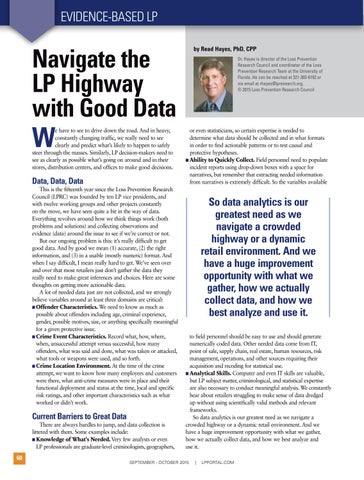EVIDENCE-BASED LP
Navigate the LP Highway with Good Data
by Read Hayes, PhD, CPP Dr. Hayes is director of the Loss Prevention Research Council and coordinator of the Loss Prevention Research Team at the University of Florida. He can be reached at 321-303-6193 or via email at rhayes@lpresearch.org. © 2015 Loss Prevention Research Council
W
or even statisticians, so certain expertise is needed to determine what data should be collected and in what formats in order to find actionable patterns or to test causal and protective hypotheses. Ability to Quickly Collect. Field personnel need to populate incident reports using drop-down boxes with a space for narratives, but remember that extracting needed information from narratives is extremely difficult. So the variables available
e have to see to drive down the road. And in heavy, constantly changing traffic, we really need to see clearly and predict what’s likely to happen to safely steer through the masses. Similarly, LP decision-makers need to see as clearly as possible what’s going on around and in their stores, distribution centers, and offices to make good decisions.
Data, Data, Data
This is the fifteenth year since the Loss Prevention Research Council (LPRC) was founded by ten LP vice presidents, and with twelve working groups and other projects constantly on the move, we have seen quite a bit in the way of data. Everything revolves around how we think things work (both problems and solutions) and collecting observations and evidence (data) around the issue to see if we’re correct or not. But our ongoing problem is this: it’s really difficult to get good data. And by good we mean (1) accurate, (2) the right information, and (3) in a usable (mostly numeric) format. And when I say difficult, I mean really hard to get. We’ve seen over and over that most retailers just don’t gather the data they really need to make great inferences and choices. Here are some thoughts on getting more actionable data. A lot of needed data just are not collected, and we strongly believe variables around at least three domains are critical: Offender Characteristics. We need to know as much as possible about offenders including age, criminal experience, gender, possible motives, size, or anything specifically meaningful for a given protective issue. Crime Event Characteristics. Record what, how, where, when, unsuccessful attempt versus successful, how many offenders, what was said and done, what was taken or attacked, what tools or weapons were used, and so forth. Crime Location Environment. At the time of the crime attempt, we want to know how many employees and customers were there, what anti-crime measures were in place and their functional deployment and status at the time, local and specific risk ratings, and other important characteristics such as what worked or didn’t work.
Current Barriers to Great Data
There are always hurdles to jump, and data collection is littered with them. Some examples include: Knowledge of What’s Needed. Very few analysts or even LP professionals are graduate-level criminologists, geographers,
60
So data analytics is our greatest need as we navigate a crowded highway or a dynamic retail environment. And we have a huge improvement opportunity with what we gather, how we actually collect data, and how we best analyze and use it. to field personnel should be easy to use and should generate numerically coded data. Other needed data come from IT, point of sale, supply chain, real estate, human resources, risk management, operations, and other sources requiring their acquisition and recoding for statistical use. Analytical Skills. Computer and even IT skills are valuable, but LP subject matter, criminological, and statistical expertise are also necessary to conduct meaningful analysis. We constantly hear about retailers struggling to make sense of data dredged up without using scientifically valid methods and relevant frameworks. So data analytics is our greatest need as we navigate a crowded highway or a dynamic retail environment. And we have a huge improvement opportunity with what we gather, how we actually collect data, and how we best analyze and use it.
SEPTEMBER - OCTOBER 2015
|
LPPORTAL.COM








